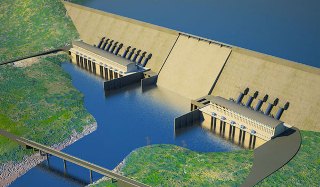Sudan’s Bashir affirms support for Ethiopia dam project
By Tesfa-Alem Tekle
April 30, 2014 (BAHIRDAR, ETHIOPIA) – Sudanese president Omer Hassan al Bashir has pledged that his country will extend the necessary support for Ethiopia’s massive hydro-power plant project which the east African country is building along the Blue Nile River.

In his keynote speech, the Sudanese leader said his country supports the construction of the Grand Ethiopia Renaissance Dam (GERD), which Egypt fears it could diminish its water share from the Nile River.
Bashir lauded Ethiopia’s contribution to furthering regional integration through energy power.
He pledged to push Sudanese intellectuals to jointly work with their Ethiopian counterparts on Nile River and Ethiopia’s power plant project.
The two-day forum concluded on Wednesday after thorough discussions how to utilise and manage the Nile’s water resources sustainably.
Participants also debated what role the Ethiopian intellectual community should play to deepen cooperation over the Nile waters and the roles the governments of the riparian states, African inter-states organisations, and the international community should play to foster cooperative atmosphere for Nile river basin.
In a joint communiqué the Ethiopian intellectuals said they encourage the riparian countries to preserve on the path of equitable and reasonable utilisation of the Nile water.
They urged all riparian countries to continuously engage in an inclusive dialogue deepening cooperation and refrain from any act of provocation.
They further said they would continuously discourage any hegemony of power over the use of the Nile’s resources.
The symposium, prepared by a local think tank group, Center for Developmental Studies (CDS) and hosted by Bahardar University, brought together the country’s most prominent scholars and prestigious institutions, as well as 32 public universities in Ethiopia.
(ST)
